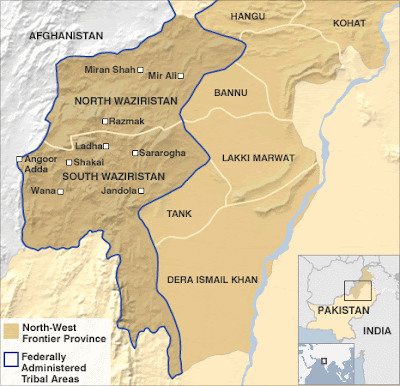 Correction: This post was written on the false premise that Wana is the hub of TTP. In fact, as Rabia has kindly pointed out, Wana is controlled by groups that have promised to stay neutral to the fight. One of the three prongs of the army offensive has taken off from Wana (the other two originating from Razmak and Tank). The post also erroneously identifies Ladha as the focus of the operation instead of Makeen. I make the point that so far the operation has been a cat and mouse game with the Taliban never sticking around to put up a serious fight, which means that the real fight will begin once the army settles in and the Taliban can go on the offensive with its blitz attacks. That assessment I would stick to despite the factual errors in this post.
Correction: This post was written on the false premise that Wana is the hub of TTP. In fact, as Rabia has kindly pointed out, Wana is controlled by groups that have promised to stay neutral to the fight. One of the three prongs of the army offensive has taken off from Wana (the other two originating from Razmak and Tank). The post also erroneously identifies Ladha as the focus of the operation instead of Makeen. I make the point that so far the operation has been a cat and mouse game with the Taliban never sticking around to put up a serious fight, which means that the real fight will begin once the army settles in and the Taliban can go on the offensive with its blitz attacks. That assessment I would stick to despite the factual errors in this post.This "mother of all battles" looks to me like little more than a cop out. The army's three-pronged strategy is set to converge not on Wana, which is the centre of South Waziristan, but on Ladha, which is on the border with army-controlled North Waziristan. They are going west/north-west from Tank and south from North Waziristan. Maybe after capturing Ladha, they'll head down towards Wana but for now there is no mention of any such plan or of Wana at all in news reports.
After a week of steady "we killed ten, they killed three" press releases, the army trumpeted its capture of Kotkai. Everyone got very excited because its Hakimullah's birthplace but really Kotkai is little more than a hamlet on the way to Ladha. Somewhere between Jandola and Ladha, Kotkai was not the theater of the great showdown either. From the body count the army gave, it seems like most of the militants fled the area. If I had to make an educated guess, I'd say they went for Wana seeing as fleeing to Ladha would have them cornered.
Now it seems like the army has its eyes set on Sararogha, another pit stop on the way to Ladha. But time is running out rapidly. If you can tell that winter is coming in Karachi, then it most certainly has to be freezing in the mountains of Waziristan. At the rate that the army is going, I have a feeling that they'll capture Ladha in several weeks by which time winter will make further advance impossible. There will be no major battle in Ladha either as the 10,000 militants of South Waziristan will all have packed their bags and moved to Wana. The army will declare victory and settle in for the winter, leaving most of South Waziristan in TTP's hands.
And of course only once the army roosts will the battle really begin. Attrition is the Taliban's tactic of choice and they're damn good at it too. Their part of South Waziristan would be a perfect base to launch suicide and fidayeen attacks on the army for the rest of winter. All we'll be able to do is sit there and take it or retreat.
(Map taken from BBC.)
After a week of steady "we killed ten, they killed three" press releases, the army trumpeted its capture of Kotkai. Everyone got very excited because its Hakimullah's birthplace but really Kotkai is little more than a hamlet on the way to Ladha. Somewhere between Jandola and Ladha, Kotkai was not the theater of the great showdown either. From the body count the army gave, it seems like most of the militants fled the area. If I had to make an educated guess, I'd say they went for Wana seeing as fleeing to Ladha would have them cornered.
Now it seems like the army has its eyes set on Sararogha, another pit stop on the way to Ladha. But time is running out rapidly. If you can tell that winter is coming in Karachi, then it most certainly has to be freezing in the mountains of Waziristan. At the rate that the army is going, I have a feeling that they'll capture Ladha in several weeks by which time winter will make further advance impossible. There will be no major battle in Ladha either as the 10,000 militants of South Waziristan will all have packed their bags and moved to Wana. The army will declare victory and settle in for the winter, leaving most of South Waziristan in TTP's hands.
And of course only once the army roosts will the battle really begin. Attrition is the Taliban's tactic of choice and they're damn good at it too. Their part of South Waziristan would be a perfect base to launch suicide and fidayeen attacks on the army for the rest of winter. All we'll be able to do is sit there and take it or retreat.
(Map taken from BBC.)


